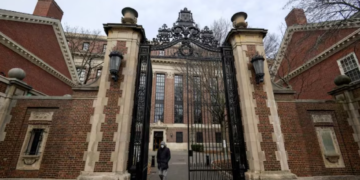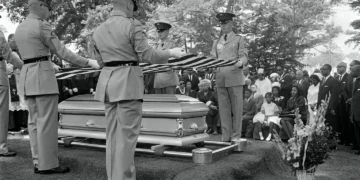Oct 12, 2024 Story by: Editor
Sherry Bradley proudly watches as a large, three-stage wastewater filtration system, about two-thirds the size of a Volkswagen bus, is installed beside a mobile home in Lowndes County. “It’s a Fuji Clean,” Bradley points out, explaining the system’s components, including the black settling tanks and the gray filter, resembling a submarine.
This is the fifth advanced septic system of its kind being installed in Lowndes County, a place that has become the center of a new civil rights struggle: ensuring proper sanitation in minority communities.
In 2021, the U.S. Department of Justice launched a civil rights investigation into whether Alabama had discriminated against Black residents in Lowndes County by failing to provide adequate wastewater treatment. The rural county, located between Selma and Montgomery, has long struggled with wastewater issues due to its sparse population, poverty, and heavy clay soil that makes traditional septic systems ineffective.
Bradley’s nonprofit, the Black Belt Unincorporated Wastewater Project, is working to combat these challenges by installing advanced systems like the one in Hope Hull. “It’s technical, but there’s a solution,” Bradley said. “And we’re bringing the solution.”
Despite the Alabama Department of Public Health’s pledge to improve sanitation after the civil rights complaint, progress has been slow, with much of the work still in the planning phase. However, nonprofits like Bradley’s have pressed forward, installing systems where they can.
For Bradley, this work is personal and continues her decades-long fight for sanitation equity in rural Alabama. After working for the Alabama Department of Public Health for 45 years, she founded the nonprofit, often using her own time to help Lowndes County residents. “When I was with the state, I was taking it up on my own time,” Bradley said. “I worked nights, weekends, and holidays.”
Now, her nonprofit focuses on providing solutions to impoverished areas in Alabama’s Black Belt, a region known for its fertile soil and deep-rooted poverty.
Bradley, 68, grew up in southeast Alabama in a poor family and is the only one among her immediate family to attend college. She graduated with a degree in sanitary science (now environmental science) from Troy State University and later earned a master’s in public administration from Auburn University.
The Black Belt, once the center of Alabama’s antebellum cotton plantations, now faces extreme poverty and declining populations. Many residents live in mobile homes scattered across the countryside, with inadequate wastewater systems.
Bradley’s group has installed over 120 onsite septic systems in the Black Belt, including five advanced Fuji Clean units for areas with the most difficult soil conditions. Her nonprofit received $2.2 million from the U.S. Department of Agriculture and $2.1 million from the American Rescue Plan Act to fund these efforts.
The Fuji Clean systems, which Bradley discovered during a trip to Alaska with retired civil engineering professor Kevin White, use a three-stage filtration process that removes solids and filters wastewater underground through sand and gravel. However, the systems can cost up to $28,000, and additional expenses, such as removing trees or upgrading electrical systems, often raise the total cost.
To ensure long-term maintenance, Bradley’s nonprofit charges homeowners $20 a month for upkeep. “How did I come up with $20? Well, I asked a homeowner, what do you think is a fair amount?” Bradley said. “When we got down to $20, they said, ‘Yeah, we can handle that.’”
Bradley’s nonprofit has also created local jobs, training residents in plumbing and electrical work. The group recently purchased an office in Hayneville, aiming to become a permanent fixture in the community. “It’s to help the people,” she said. “They don’t have to mail in bills. It also shows that we’re here for the long haul.”
Alabama’s State Health Officer, Dr. Scott Harris, acknowledged the complexity of the project, stating, “It’s a really big project, and so it has taken a while to get everybody through the process.” The health department, which is primarily a regulator, has had to contract out much of the installation work, as it lacks experience overseeing large-scale infrastructure projects.
Harris emphasized that the department’s focus has been on surveying Lowndes County’s 10,000 residents to prioritize those most in need. “There’s always going to be more need than we have resources to help with,” Harris said.
The state has also allocated $10 million in federal funding to Hayneville for municipal sewer improvements and is exploring smaller, cluster systems for rural areas. While Lowndes County has received the most attention, other Black Belt counties, like Wilcox, face even worse wastewater challenges.
Lowndes County’s unsanitary conditions gained national attention in 2017 after a Baylor University study found genetic evidence of hookworm in stool samples from residents. Hookworm, an intestinal parasite, is typically found in developing countries with poor sanitation. The discovery prompted visits from U.S. and international officials, including former Vice President Al Gore and current EPA Administrator Michael Regan.
Bradley was particularly affected by the attention. “It got to me really bad when this gentleman from the United Nations came down and said Lowndes County was like a third-world country,” she said.
Subsequent studies, however, did not find hookworm in the region. Dr. Claudette Poole, a pediatric infectious disease researcher at the University of Alabama at Birmingham, said her team collected 700 stool samples from children in the Black Belt and found no evidence of hookworm. Poole speculated that the genetic material found by Baylor might have come from older infections or that the parasite had since disappeared.
Regardless of the hookworm findings, Harris emphasized the importance of addressing the county’s wastewater issues. “Whether we found hookworms or didn’t,” he said, “it wouldn’t change the fact that [infrastructure] needs to be addressed.” Source: InsideClimate News

















